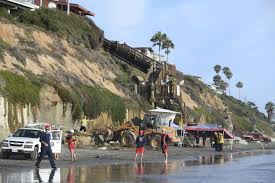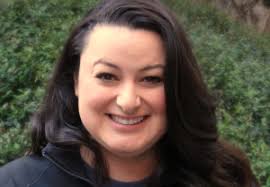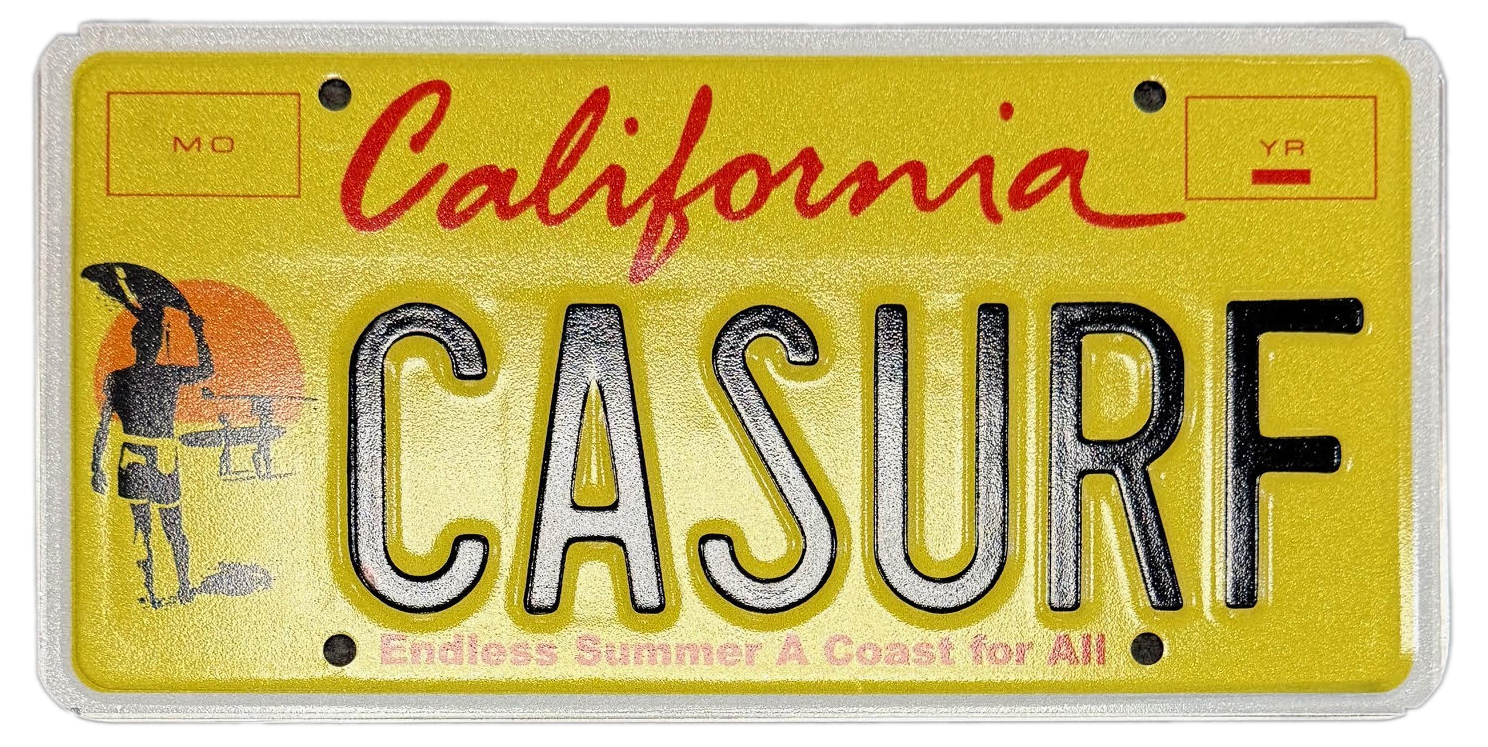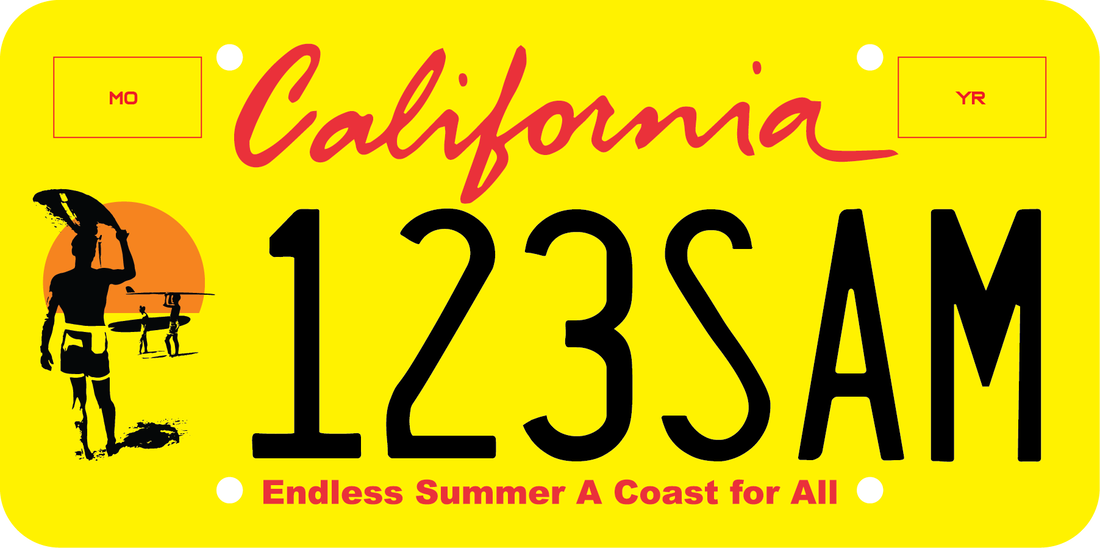|
California drivers can now take a piece of surf history on the road while championing coastal preservation. After nearly a decade in the making, the iconic Endless Summer license plates are finally here, blending a celebration of California’s surfing culture with a mission to protect our cherished coastline. The last step is to complete the required 7,500 presale. CLICK HERE TO ORDER NOW. In collaboration with California Coastal Conservancy, Bruce Brown Films, LLC has unveiled these stunning, specially designed plates inspired by the legendary 1964 Endless Summer poster. Featuring surfers silhouetted against a radiant sunset, this vibrant design is more than just a tribute to Bruce Brown's groundbreaking film—it’s a pledge to preserve California’s coastal beauty for generations to come.
Help get the Endless Summer plate on California roads, pre-order your Endless Summer plate today at surfPlate.com and help make waves for a better tomorrow.
0 Comments
For almost a century, the automobile has been much more than a mere mode of transportation, but rather an extension of its owner's personality with its style and panache. The auto makers sought to capitalize on America's thirst for style and power in providing sleek and faster cars which pandered to the public's desire to have their car reflect their own self image. Ever changing designs, brighter colors and engine size contributed to the symbolic nature of the automobile for its owner. As an extension of the goal of making your car an extension of your personality or self-image is the specialty license plate. Usually connected to a charity or state agency, the specialty license plate provides the quintessential "win win" dynamic in that the vehicle owner can both help a legitimately good cause and own a license plate make a social statement to those who see it, or maybe just look cool with its colors and design. In California, a new specialty plate has been approved which boldly touches all of those bases. It is the Endless Summer specialty license plate, which incorporates the theme from Bruce Brown's iconic Endless Summer movie from the 1960's. The exquisite design of the plate, with its bright yellow background and setting sun, evokes imagery of California's pristine beaches, beautiful sunny days and sport of surfing and embraces the California state of mind. Because funds from the sale of this specialty license plate help fund California's Coastal Conservancy, which promotes and protects the public's access to California's beaches, anyone who purchases the plate not only gets to display the beautiful and radiant plate on their car, but also promotes the many goals of that wonderful state agency. The legacy of Endless Summer is that it is more than a movie of youth, oceans and the pursuit of the perfect wave. It is symbolic of an optimistic state of mind reflecting sunny days, summer breezes and beautiful vistas. You can help preserve California's coast and project a sunny and optimistic statement for your car or motorcycle. For more information as to how you can register for the presale, click here. The proposed Endless Summer license plate has been awaiting final visibility testing by CHP for over 3 months.
California Code of Regulations, 13 CACode of Regs, 160.04, requires: (4) The design must meet the following standards after testing by the Department of California Highway Patrol (CHP): (A) The registration number must be clear and legible to a person with 20/20 vision in daylight from a distance of 75 feet, and in darkness with low-beam headlamps from 75 feet; and (B) The registration number must be able to be accurately perceived by Automated License Plate Reader technology in use in California from a distance of 35 feet at daytime, dusk and nighttime. The California State Coastal Conservancy announced more than $39 million in funding for projects to improve public access, climate resilience, habitat values, and inclusion at the coast.
“The Coastal Conservancy’s vision is of a beautiful, restored, and accessible coast for current and future Californians. To achieve this, we fund projects that support the coast’s natural resources, projects that prepare the coast for the challenges of a changing climate, and projects that help more people enjoy the coast.” said Amy Hutzel, Executive Officer of the Coastal Conservancy. Among the awards were several projects that will expand the Californians’ ability to access and enjoy the coast: $1,104,736 was awarded to eight non-profit organizations for Coastal Stories projects that will create storytelling installations, murals, or interpretive materials that represent diverse communities’ perspectives that historically have been excluded from narratives of California’s coast and publicly accessible lands. This is the second round of funding through the Conservancy’s Coastal Stories grant program. The Big Sur Land Trust was awarded $2,750,000 to acquire the 84-acre Hiss Parcelin the City of Monterey for natural resource conservation, California Native American tribal cultural resource conservation, habitat connectivity, California Native American tribal access, and public access. Orange County Coastkeeper was awarded $250,000 for the Beach and Coast Accessibility Program to provide grants to nonprofits, public entities, and tribes for beach wheelchairs and other equipment to increase accessibility to California’s beaches and coast in coastal counties statewide. Sustainable Conservation was awarded $270,300 to augment the Conservancy’s existing grant of $620,000 to advance adoption of, and conduct outreach to facilitate the use of, programmatic permits for aquatic habitat restoration and water quality improvement projects. Defenders of Wildlife and Sea Otter Savvy were awarded $174,400 to implement two separate projects to aid in the recovery of the southern sea otter. FOR MORE INFORMATION on the awarded projects CLICK HERE. You did your part for Earth Day by picking up trash at a beach cleanup and now you’re done, right? Not so fast. Cash Daniels wants you to do a bit more. The 12-year-old from Chattanooga, Tenn., has personally organized cleanups and removed thousands of pounds of garbage over the last five years from a stretch of the Tennessee River near his home. The Tennessee is one of the most microplastics-polluted rivers in the world. “I’m making a difference on the environment,” he said in a recent phone call. “I don’t like seeing plastic lying around anywhere.” His efforts have led to partnerships with nonprofit organizations such as Tennessee Beautiful and Keep America Beautiful. Daniels, a finalist for Time magazine’s Kid of the Year 2022, also co-founded a group called the Cleanup Kids to motivate others to follow his example. Now he’s challenging young people around the world (or anyone, really) to collectively pick up 1 million pounds of litter in 2022. How will he measure their progress? Through trash-tracking apps like Litterati, which encourages people to pick up trash and share photos online to create a global cleanup community. How much trash is there in the U.S.? Keep America Beautiful’s 2020 National Litter Study estimates there are 50 billion pieces of litter or “152 pieces of litter for every U.S. resident.” That means if each person picked up their share, the country could be litter-free. Start by joining the 24th Great American Cleanup, which is underway now through June 22. It’s hosted by Keep America Beautiful, which started in 1953 when litter was mostly found alongside America’s highways. The organization offers free cleanup kits to help you get started. Other things to do: In Southern California, join year-round cleanup groups and turn out for these events: Other things to do: In Southern California, join year-round cleanup groups and turn out for these events:
Story by BY MARY FORGIONE CLICK HERE FOR MORE
 Republican Sen. Pat Bates Republican Sen. Pat Bates Surfing advocates and the California Coastal Commission rained ire this week on a bill that would allow San Diego and Orange county homeowners to build seawalls by right, sidestepping commission oversight. Seawalls are highly controversial in California, viewed as a property defense against sea-level rise and the crumbling of coastal cliffs. At the same time, seawalls prevent the natural replenishment of beach sand from cliff faces and land runoff. Republican Sen. Pat Bates, who represents portions of San Diego and Orange counties, brought SB 1090 before the Senate Natural Resources and Water Committee allowing testimony from pre-selected speakers. The father of an Encinitas family that lost three members when a cliff collapsed on top of their weekend picnic last year gave emotional testimony on behalf of the bill. “There is no plan for sand replenishment or any other bluff changes to increase safety on this very popular stretch of beach where my accident occurred,” said J. Patrick Davis, a pediatric dentist. Seawalls, or “hard armoring” as Surfrider Foundation’s scientist Jennifer Savage called the structures, do not make beaches safer, she said. “They destroy the beach by speeding-up erosion,” Savage said.  Encinitas cliff collapse Encinitas cliff collapse The Coastal Commission representative argued the Encinitas incident was a tragic accident, not due to a lack of action by the commission to approve or deny a seawall in the area. “The bill is designed to make it faster, easier and cheaper to build seawalls primarily to protect private residential development,” Sarah Christie, the commission’s legislative director, testified. “For every seawall that is built, the public loses a beach.” There was no committee vote, however. Sen. Henry Stern, the committee chair, and Bates agreed ahead of time to hear the bill without the vote, and testimony was heard on May 26, 2020. said Josh Kirmsse, Stern’s communications director. The Committee Analysis states that for Orange and San Diego Counties, this bill would effectively authorize by-right construction of sea walls/other hard shoreline structures and only allow the commission or a local government to deny an application for a shoreline protective device only if they determine that the construction of a shoreline protective device would constitute a substantial threat to the public health or safety. It also seeks to prohibit a state agency or local government to adopt an ordinance, regulation, policy or rule that is inconsistent with these requirements. Supporters of the bill include California Apartment Association, California Association of Realtors, Newport Beach Association of Realtors, North San Diego County Association of Realtors, Oceanside Chamber of Commerce, Orange County Realtors, County of San Diego, and ‘four individuals’.  Opposers to the bill included Azul, Azul was founded in 2011 by Marce Gutierrez-Graudins, to bring Latinxs perspectives and participation to ocean conservation, and are legally organized under the Trust for Conservation Innovation. After experiencing how mainstream ocean conservation efforts and campaigns were leaving Latinxs out, Marce decided to start Azul to engage her community in protecting coastal resources and marine life. In a joint sign-on letter expressing strong opposition, Azul, among others, writes that SB 1090 “would pave the way for private property owners to effectively hasten and accelerate the loss of public beaches from the Orange County and San Diego coasts under the guise of claiming to improve public safety.” Others who registered in opposition to the bill were California Coastal Protection Network, Heal the Bay, California Coastal Commission, California Coastkeeper Alliance, California League of Conservation Voters, California Native Plant Society, Center for Biological Diversity, Clean Water Action, Defenders of Wildlife, Natural Resources Defense Council, Plastic Pollution Coalition, Seventh Generation Advisors, Sierra Club California, Surfrider Foundation, The 5 Gyres Institute, The Center for Oceanic Awareness, Research, and Education (COARE), The Honorable Betty T. Yee, California State Controller, and the Nature Conservancy. Heal the Bay is an advocacy group of activists based in Santa Monica, California. The focus is protecting coastal waters and watersheds of southern California. Senators will do more work on the legislation at the committee level. The bill analysis also states that "erosion will be exacerbated by the presence of sea walls on the seaward size of the sea wall. Public accessibility will be correspondingly compromised. Beaches need natural erosion and sediment transfer for their health. Living shorelines, soft armoring and managed retreat, if necessary, should be prioritized. How can shoreline armoring be 'designed to mitigate or protect against coastal erosion' as it is known to exacerbate that very thing?" It also comments that the bill "provides an implicit public subsidy to private landowners." Click here for the full bill text.  Outerknown, a clothing brand co-founded by pro-surfer Kelly Slater, makes effortless and casual beach styles rooted in sustainability and transparency. Over 90% of Outerknown's products are made from organic, recycled, or regenerated materials. The company's manufacturing partners also follow strict guidelines of safety and working conditions. Slater pointed out that "conscious development takes time and investment. There are added costs in creating quality product made to last, in finding and partnering with the right factories that value worker well-being, and in sourcing and leveraging materials that cause less harm." "At the end of the day, we're looking at the long run and what's best 'For People and Planet.' We're putting in the work to build a truly sustainable model rather than zeroing in on short-term trends or financials," he says. Outerknown has partnered with Bruce Brown films LLC to launch a new collection - Bruce Brown Films available in store and online. A recent comment on the store's website stated: "Honestly, I hadn’t thought about Endless Summer for years. It’s always been one of my favorite movies and movie posters. I was recently in a VRBO and the owner was a Tower Records Exec. In a prior life. His home was filled with vintage concert and movie prints. I immediately was drawn to the Endless Summer print with its amazing colors and the silhouettes of the surfers. I went home and bought a framed print and watched the movie. Totally inspiring and the Soundtrack by The Sandals is so cool. Then...I get the email from Outerknown featuring Bruce Brown. I was like, this is too good to be true. Feels like serendipity! Needless to say, I immediately bought the shirt and it is fantastic. Feels good to wear it. Ahh, Karma." Jake'
The store is now open at The Point in El Segundo: The Point Shopping Center, 850 S. Pacific Coast Highway, Suite D 106, El Segundo, CA 90245. Best of luck to Kelly on this new adventure. |
blogArchives
May 2025
Categories
All
|
Funding from this plate will be directed to programs that promote coastal access, make coastal lands welcoming to all, and increase opportunities for coastal enjoyment.





